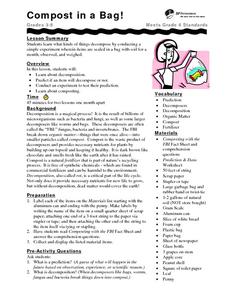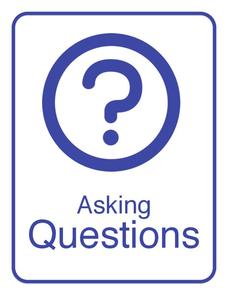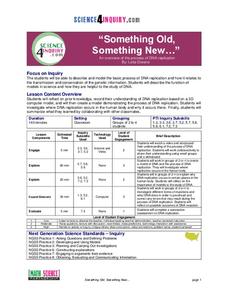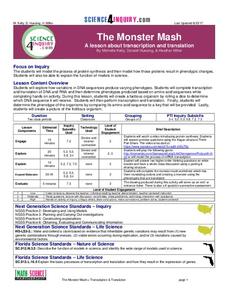Texas State Energy Conservation Office
Investigation: Conservation of Energy
By rolling marbles down a six-foot length of track, physical scientists determine how much energy is lost to heat. It is recommended that you opt for the foam pipe insulation track because more friction slows the marble, allowing...
Berkshire Museum
Where’s the Water?: Acting Out Science Cycles
Young scientists transform themselves into rivers, oceans, clouds, and drops of water in order to explore the water cycle. After assigning and explaining to students their different roles in the activity, the teacher reads aloud a...
NASA
Soda Straw Rockets
Three, two, one, blast off to a better understanding of force and motion with this exciting science lesson! Beginning with a discussion about rockets and gravity, young scientists go on to complete a series of worksheets about net forces...
Government of South Australia
Don't Waste Your Energy
Don't lift another finger, this physical and environmental science unit has everything you need to begin teaching your class about energy. Starting with a look at the greenhouse effect, these lessons and activities take young scientists...
NASA
The Science of the Sun
There's more to that glowing ball of light in sky than most children realize. From the overall structure of the solar system, to the changing of the seasons, these hands-on lessons open the eyes of young scientists to the important role...
NOAA
A Moving Crust
Young scientists piece together the geological puzzle that is the earth in the third and final lesson of this earth science series. With the help of numerous multimedia resources and a series of engaging hands-on activities, students...
Education Outside
Compost in a Bag
Young scientists create a compost bag, predict changes, and after one month, examine the bag to observe the changes that have occurred.
Colorado Unit Writing Project
Simple Machines
Planning an elementary science unit has never been simpler! These twelve lessons guide young scientists through an exploration of simple machines and their many uses in the real world before asking them to apply their learning in the...
Bozeman Science
NGSS Practice Posters
Begin the year with an emphasis on the NGSS practice standards. The resource provides an 8x10 size poster for each standard. When hung in a classroom, learners have a consistent reminder of what it means to be a scientist.
National Library of Medicine
Your Environment, Your Health: Air Quality
Some scientists argue that air pollution now causes more deaths than smoking. The second unit in a six-part series focuses on air quality. Scholars learn what's in the air, how clean the air around their school is, and what they can do...
Science 4 Inquiry
Deforestation
Young scientists observe deforestation from satellite photos and discuss the importance of forests to the global environment. They then simulate a plot of forest when farmers move into the area over the course of seven years. Finally,...
Science 4 Inquiry
It's Not All Visible
Electromagnetic waves travel though empty space, something no other wave type can accomplish. Young scientists learn more about the entire spectrum of electromagnetic waves. They sort cards and apply their knowledge to create models of...
Science 4 Inquiry
Journey Through the Spheres of the Earth
Each of the Earth's spheres interacts with the other spheres in predictable ways. Young scientists explore these interactions through a hands-on activity, graphing, and watching a video. They summarize their knowledge in a video or...
Science 4 Inquiry
"Something Old, Something New..."
Young scientists learn about DNA replication through a video and model creation. They answer analysis questions before exploring the role of mutations and then complete a summative assessment.
Science 4 Inquiry
The Monster Mash
Young scientists create monsters by applying their knowledge of transcription and translation. They randomly find the DNA, assign it a codon, and build monsters piece by piece.
Science 4 Inquiry
Investigating How Heat Flows
It is impossible to cool down a glass of water by adding ice. Young scientists explore heat transfer through videos, experiments, and interactive games. They quickly catch on that the water melts the ice and things aren't always as they...
Science 4 Inquiry
Phases of the Moon
The moon takes just over 27 days to orbit around Earth. Young scientists position themselves as the earth as they rotate around the sun and hold the moon. This allows them to observe the patterns and phases of the moon.
Science 4 Inquiry
Genetics, Genetics, and More Genetics: Exploring Independent Assortment and Non-Mendelian Genetics
Two individuals share 99.9 percent of their genetic codes, yet diversity is observed everywhere. Young scientists learn about diversity through hands-on activities and an experiment. They apply the concepts of independent assortment and...
Science 4 Inquiry
Plant Structures Lab Stations
In China, hibiscus is known as the shoe flower because it is used to polish shoes, while in Hawaii, it is honored as the state flower. Young scientists learn about the structure and function of flowers. They dissect hibiscus flowers,...
Science 4 Inquiry
Musical Vibes with Palm Pipes
Ancient people used musical pipes as early as the third millennium BCE. Young scientists explore the workings of musical pipes to better understand the relationship with frequency, length of pipe, and sound waves. They determine the...
Science 4 Inquiry
Trick or Science: Catching the Light
Your class might be surprised to learn that mirrors have been around since the first century AD! Young scientists explore reflection and refraction of light through a series of challenges. They use this knowledge to design their own...
PBS
NOVA Sun Lab Lesson Plan
Looking for a sun-sational multi-lesson plan full of videos, simulations, and discussion? Introduce your young scientists to all things solar with a four-part hands-on adventure. Pupils learn the basics of solar anatomy, space weather,...
Kenan Fellows
Sensors in Chemistry
The Environmental Protection Agency monitors sensors to track air pollution and set clean air standards. Enthusiastic young scientists use similar sensors to gather data in their area and then apply the gas laws and conservation of...
American Museum of Natural History
Going, Going...Gone?
Young environmentalists consider how scientists are attempting to save endangered species. They read about what causes extinction and steps to take to minimize the threats.
Other popular searches
- Famous Scientists
- Famous Scientists Alive
- 10 Famous Scientists
- Cell Theory Scientists
- Famous Scientists Botany
- Social Scientists
- Famous Scientists From Italy
- 5 Famous Scientists
- Famous Scientists Reports
- Famous Scientists Project
- 40 Famous Scientists
- Famous Scientists in Florida

























